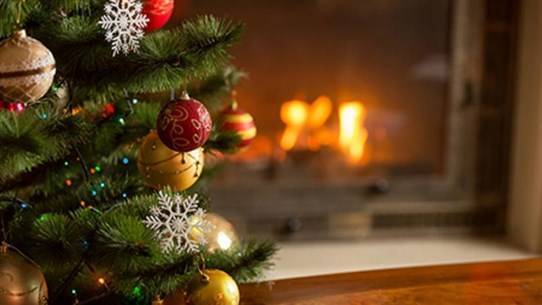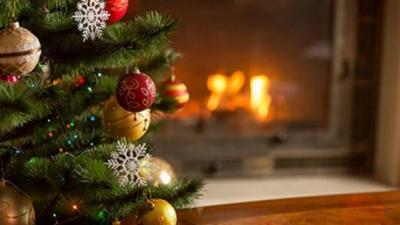The General Directorate of Civil Defense at the Ministry of Interior and Municipalities issued the following statement: "Due to the increase in house fires at this time of year, mostly caused by neglecting various fire prevention guidelines, the General Directorate of Civil Defense urges citizens to take necessary precautions to minimize damage and avoid repercussions, and to adhere to the following guidelines for public safety.
**Holiday Decorations:**
- Ensure that the electrical wires for the Christmas tree lights are safe before use.
- Use a suitable circuit breaker for the tree's lighting network and nativity scene in case of any short circuit.
- Do not overload electrical circuits or extension cords beyond their capacity.
- Follow the instructions displayed on cable labels.
- Turn off holiday lights before leaving the house or going to sleep.
- Acquire a Christmas tree made from non-flammable materials.
- Do not place it near heating devices that use open flames.
**Heating Methods:**
- **Gas burners:** Clean burners, especially spray nozzles, and when installing, keep burners and diesel tanks in separated rooms before use.
- **Electric heaters:** Ensure that their electrical supplies are correct and safe.
- **Gas heaters:** When periodically replacing the gas cylinder, ensure the gas hose is intact and free of cracks; it is preferable to replace it annually.
- **Charcoal grill:** Ensure that the charcoal is fully ignited before bringing it indoors. Ventilate the area periodically to allow fresh oxygen in.
- Keep any flammable materials away from heating methods with exposed heat (curtains, bed covers, etc.).
- Continuously ventilate homes to avoid suffocation when heating with coal, wood, or gas.
- Do not place clothes near heating devices to dry them.
**In Case of a Gas Smell:**
- Do not turn lights on or off or light anything that may produce a spark (matches, lighters, candles).
- Close the gas cylinder and open windows for ventilation.
- Do not use water to extinguish a frying oil fire.
- Do not use a fire extinguisher as the pressure can spread the oil fire.
- Close the gas cylinder and use a fire blanket or damp cloth to cover the pan and smother the fire.
**For Safe Cooking:**
- Stay in the kitchen while cooking.
- Do not leave cooked food unattended, as oils and fats can ignite easily.
- Close the gas cylinder when finished cooking.
- Keep children at a safe distance from the cooking area.
- Wear short or tight sleeves. Avoid loose sleeves and long hair near flames.
- Keep the area around your stove clear of easily ignitable items.
**Electricity:**
- If a circuit breaker is damaged, don’t just replace it; find out the reason in the system and solve the problem.
- Do not replace a circuit breaker with one that exceeds the current rating of the circuit.
- Avoid using multiple devices, such as irons or heat-producing appliances, at the same time on the same circuit.
- Turn off or unplug electrical devices when not in use.
**Smoking and Candles:**
- Do not leave cigarettes in an ashtray for too long, as they may fall onto flammable materials.
- Ensure the cigarette is extinguished before throwing it in the trash.
- Keep candles, matches, and lighters out of children's reach.
- When lighting candles, place them on a fire-resistant surface (a metal tray with some sand) away from flammable items like shelves, curtains, and clothing.
- Do not leave candles burning unattended and extinguish them before leaving the room or going to sleep.
**Upon Discovering a Fire or Smoke:**
- Remain calm and act quickly.
- Treat all fires as dangerous.
- Evacuate the area calmly.
- Install smoke alarms in all rooms for maximum protection.
- Cut off electricity and remove items from near the fire if it is safe to do so.
- Ensure doors are closed (to contain smoke/fire).
- Do not attempt to fight the fire unless you are trained to use a fire extinguisher and the fire is in its early stages.
- If you are in a building, do not go to the stairs if smoke is thick in the stairwell. Go to a balcony or window where firefighters can see you and rescue you.
- If you are on upper floors, open the roof hatch to release gases and smoke before they build up and cause a rapid fire outbreak.
In case of any incident, immediately contact the Civil Defense teams at the emergency number 125."




